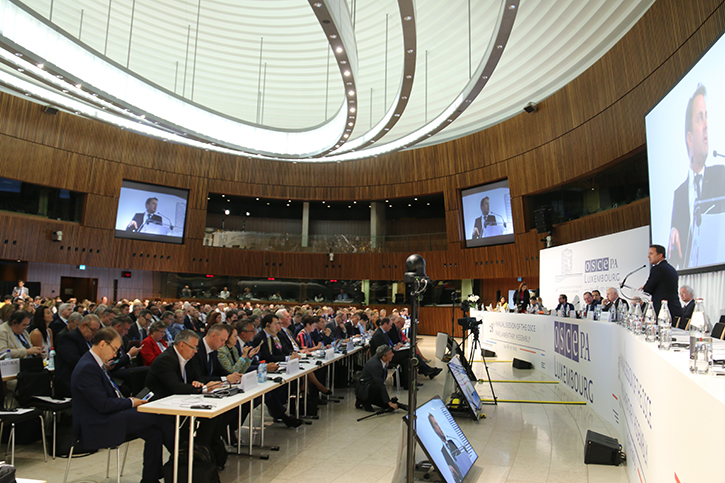The Political Affairs and Security Committee of the Parliamentary Assembly of the Organization for Security and Co-operation in Europe (OSCE) adopted a Ukrainian resolution against Russia on July 6.
It condemned what it called Russia’s militarization of the Azov Sea and Crimea and called for Russian-led forces to cease fire in the Donbas.
The OSCE is the world’s largest intergovernmental security-oriented organization. Its Parliamentary Assembly includes lawmakers from European and North American countries. The 323-member Assembly is mandated to facilitate inter-parliamentary dialogue between its member states.
The July 6 resolution states that Russia must withdraw all military personnel from Crimea and from the Ukrainian part of the Sea of Azov and Black Sea. It also reaffirms that Russia must fulfill the Minsk peace agreements, cease military actions and withdraw heavy weaponry from Ukraine’s eastern regions.
The second agreement signed in Minsk in February 2015 specifies the conditions for deescalation of the conflict in Russian-occupied regions of the Donbas, where Russian proxy forces have been fighting a war against Ukraine that has claimed about 13,000 lives.
One of the Minsk requirements is that Ukraine’s military and Russian-backed troops must withdraw heavy military weaponry to pave the way for peace talks.
Refat Chubarov, a Ukrainian lawmaker and OSCE Parliamentary Assembly member, wrote on Facebook that the resolution was supported by 54 committee members, with only six members voting against, and six lawmakers abstaining.
John Whittingdale, a U.K. lawmaker, delegate to the OSCE and a member of the committee, told the Kyiv Post that earlier that same day, Russia sought to cancel an earlier resolution which stated that Russia has been systematically violating the Minsk Agreements. The committee declined to cancel it.
Ukraine met strong support at the OSCE Assembly in Luxembourg. “The main achievement is that Ukraine’s resolution had strong support and was only opposed by Russia,” said Whittingdale.
The decision of the committee is the good news for Ukraine, following an earlier decision in the Parliamentary Assembly of the Council of Europe (PACE), a major intergovernmental organization focused on human rights, which unconditionally reinstated Russia as a full member on June 26.
Russia has previously failed to fulfill multiple resolutions and rulings on withdrawal from Crimea, deescalating the conflict in the Donbas and releasing Ukrainian hostages from Russian prisons, including the 24 sailors captured in international waters of the Black Sea last November.
Artur Gerasimov, a Ukrainian lawmaker and head of Ukraine’s delegation to the OSCE PA, told the Kyiv Post that he did not expect such strong support for Ukraine’s resolution after what had happen in PACE.
“We’re not planning on finishing here, (on July 7) a number of important resolutions will be voted on – a resolution on (Russian withdrawal from) Georgia, one from Lithuania on Nord Stream 2,” said Gerasimov. “We didn’t have unity and support in PACE, we have it here,” he added.



